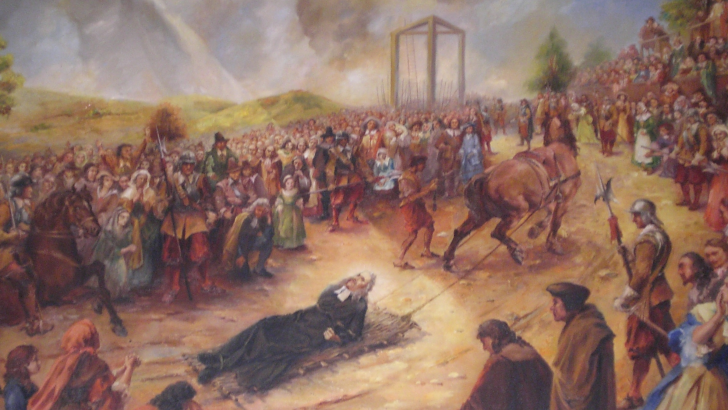Britain should do more to remember the victims of its religious persecution, writes Francis Campbell
On this day in 1681, a short distance from this studio, an innocent man was hanged, drawn and quartered. That was the punishment for high treason. Today, July 1, marks his feast day for he was St Oliver Plunkett. Not the Oliver mainstream English history remembers – that one is Cromwell.
St Oliver Plunkett’s crime was the Faith he professed and the office he held. He was the Archbishop of Armagh. He became a pawn in a 17th-Century game of political intrigue, power and fake news, between the Earl of Essex and the Duke of Ormond.
Even at the time of his trial, King Charles II knew him to be innocent, but he would not risk his power to save him. St. Oliver was to be the last of what became known as the Tyburn martyrs.
Circular stone
Today the spot where he and the other people of faith from all traditions, Protestant, Catholic, dissenter and non-believers, were tortured to death is marked with a broken, circular stone in the middle of a traffic island near Marble Arch. Traffic whizzes by ignorant of its history.
The other Oliver, Cromwell, that is, well he has a statue and a green named after him just by the public entrance to Parliament.
Even the Foreign Office had a building called Cromwell House. All no doubt due to his victory in the English Civil War.
At the time the statue was erected in 1899 by Lord Roseberry, it divided MPs with Conservatives and Irish nationalists opposing it and Liberals and Unionists supporting. Is it progress that it doesn’t seem to matter anymore?
When I first saw that statue, I couldn’t square how someone who had committed acts of genocide in Ireland against Catholics and imposed the penal laws could deserve such honour. The older and maybe wiser self accepts that history is complex and Cromwell is also a divisive figure in English and Scottish history. It all depends on one’s experience of history.
If we accept one version of history while ignoring the others then we end up not knowing what we don’t know”
We can dismiss this as all being history. But it isn’t that simple. It’s not about toppling statues or renaming buildings to accommodate the present with the past. For Christians, the reward is not a temporal statue.
But when we are left with a patrimony that honours one controversial figure, but not the victims of their legacy, we are left with a choice to make in the present.
If we accept one version of history while ignoring the others then we end up not knowing what we don’t know and mired in partiality.
If we do that to history, then we can do that in the present. How we remember tells us something not just about what we were, but who we are.
Prof. Francis Campbell is Vice-Chancellor of St Mary’s University, Twickenham, and former UK Ambassador to the Holy See. The above was broadcast for BBC Radio 4’s Thought for the Day.


 The 1681 execution of St. Oliver Plunkett.
The 1681 execution of St. Oliver Plunkett. 